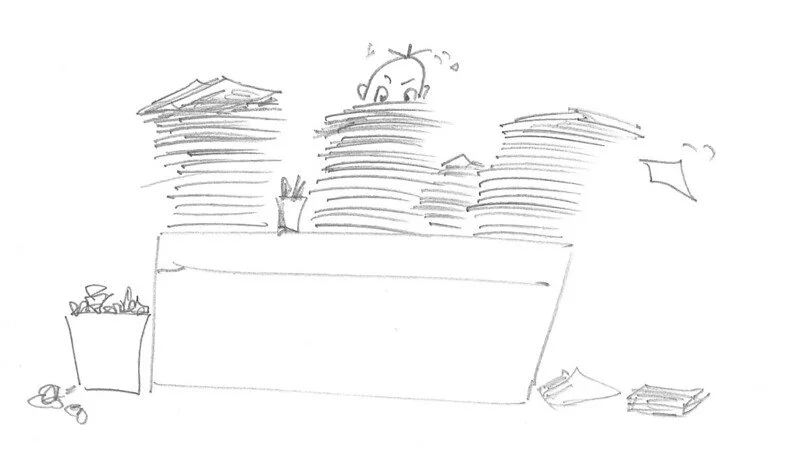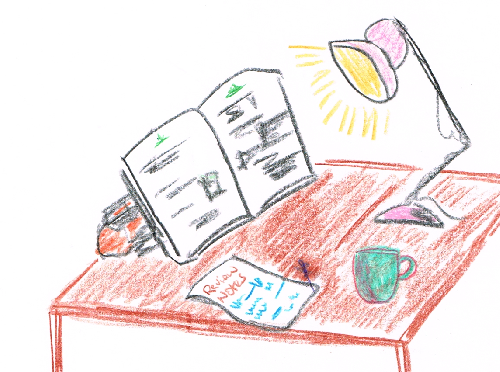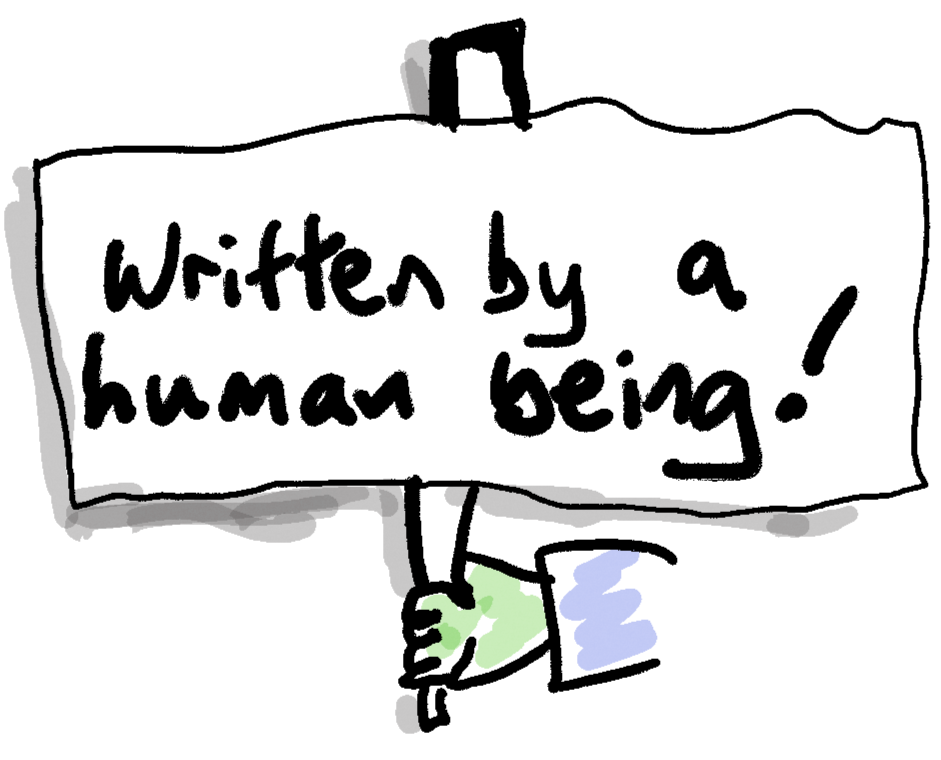Is a 2014 book on managing the computing provision in a school still worth buying?
Read MoreOn top deck of a number 8 bus, by Terry Freedman
A Touch of Humanity (updated)
It is a sad but incontrovertible fact that one of the unfortunate effects of technology is that it provides some people with the excuse they need to abrogate all sense of personal responsibility or discretion.
Read MoreTerrified, by Terry Freedman
On becoming a student again
I spend the whole of the lesson in abject terror that I am going to be asked a question.
Read MoreBett 2020 Dates for your diary
Bett 2020 is coming…
Read More5 interesting technology sessions at the London Book Fair 2019
UPDATED! Here are 5 talks and one event at the London Book Fair that you may be interested in. Plus, a free personal selection from myself.
Read MoreConference, by Terry Freedman
Conference: Next steps for education technology - improving educational outcomes
This conference, in London in April 2019, looks at a range of issues around education technology.
Read MoreTechnology-Authorised Madness
A blast from the past -- with the emphasis on 'blast'. What I thought of self-service checkouts when they first appeared.
Read MoreExplorations
 I’ve been exploring seven things today, and I thought you might be interested. They are a blog, another blog, another blog and yet another blog, a new service from Voki, a book, and photography.
I’ve been exploring seven things today, and I thought you might be interested. They are a blog, another blog, another blog and yet another blog, a new service from Voki, a book, and photography.
An Email Retrospective
I was looking for a particular video I made, to illustrate an article about the forthcoming edition of Computers in Classrooms (the fantastic free newsletter available only from this website), when I came across this video about email.
I think it was the first video I ever made for the internet, and as it was my first attempt I got the video settings wrong. In addition, there was no script, just Elaine and I looking through old emails to see if anything had changed. It was our way of celebrating ten years on the web, back in 2005 (it's ok, I know: we really do need to get out more).
Anyway, it's so boring that it's quite funny. Well, I think so anyway.
It includes one of those awful spam emails which contain just random sentences, except that back in 2005 I don't think I'd quite cottoned on to the fact that it was spam.
Elaine had suggested a friendly wager, that the emails would reveal that nothing had changed over ten years. I think I would say that she won.
I'll leave you with one final thought: what can be sadder than the fact that in 2005 I still had emails going back to 1996? How about the fact that, five years later, I've still got them?!
Well, we all need a hobby.
On a more serious note, I do find it interesting, every few years, to look through old emails to find out what I was concerned with, and what the burning issues of the day were. We lose too much personal and organisational history in today's ephemeral society, which is a pity: it's good to reflect on the journey now and again.
Vlog01.mpg
Uploaded by terryfreedman.
28 million emails
Erm, that's how many emails were languishing in the Trash server on my webmail account. I thought I'd emptied the trash folder every so often, but obviously not. I wonder if that's what has been causing my web mail to be so incredibly slow?
I am now going off to sit in a darkened room where I can hang my head in shame at allowing that many spam messages to accumulate.
This Small World
We take so much for granted, we digital citizens. But every so often I stop to think of the 'amazingness' of it all. Here's an example of what I mean:
 It's a small worldI've just come back from the Naace 2010 conference in England where I met up with a Canadian fellow, Michael Furdyk, co-founder of Taking IT Global. I first met Michael at the ICTLT 2010 Conference in Singapore a couple of weeks ago.
It's a small worldI've just come back from the Naace 2010 conference in England where I met up with a Canadian fellow, Michael Furdyk, co-founder of Taking IT Global. I first met Michael at the ICTLT 2010 Conference in Singapore a couple of weeks ago.
He happens to know someone called Derek Wenmoth, from New Zealand, whom Elaine and I had dinner with on Friday night. He was in Singapore too, and I first 'met' him by being introduced to him by Sharon Peters, a Canadian Blogger.
If my memory serves me well, Sharon introduced herself to me after hearing of a book I was on, through Jennifer Wagner, an American educator.
And I think that Jennifer and I got to know each other through the blogosphere after I'd published a free book about Web 2.0, Coming of Age, that feaured, amongst other writers, David Warlick, who also lives in the USA.
Who could have predicted 15 years ago that anything like this would ever happen?
Email: The Electronic Leash?
I am not sure why it is, but whereas channels such as Twitter and Facebook are pleasant and liberating, email is somehow depressing and restrictive. Perhaps it's because it is associated with work rather than pleasure, or because it is, psychologically, more demanding. Perhaps, in my case, right now, it is because I have just returned from the #Naace2010 conference (which I shall write about in due course) -- and to 3,697 emails.
No, the conference was not 3 months long, it was 3 days in total. And yes, they did have wi-fi, so in theory I could have dealt with some of the deluge whilst at the conference. Here are a few of my thoughts on the matter. My reaction to nearly 4,000 emails waiting for me
My reaction to nearly 4,000 emails waiting for me
The trouble with alerts
Setting up alerts to tell you when something has been downloaded is, usually, good. In my case, I find that seeing a few downloads of something I've published, each time I check my mail, lifts my spirits. Thus it was that when I published the Amazing Web 2.0 Projects Book a few days ago, I set up an alert of this nature. I should have turned off the alert before I left for the conference, but in my naivety I assumed there would be a few hundred downloads at the most.
I could not have been more wrong.
As of a few minutes ago, it has been downloaded 4,758 times, and the majority of the 3000+ emails were the associated alerts.
So my conclusion about this is: disable any automated alerts and things of that nature before leaving home for more than a day or two!
Web mail can be slooooow
Checking my email at the hotel was a nightmare. For some reason, my main provider's web mail service is always really slow. It's cope-able with when there are just a few emails, but not when there are over 90 pages of messages. It got to the stage where each page was taking several minutes to load. I can get email on my phone, but I've learnt from past experience that if the number of messages becomes too large, the phone grinds to a halt. I found that out in Phoenix, Arizona a few years ago, when I spent a merry hour in an organic wholefood café (I don't know why I put that detail in, but I just felt the need to give the complete picture!) furiously deleting stuff and even uninstalling apps I'd never used.
Conferences are for conferencing
The other thing is that, whilst I try and keep on top of what's coming in to my email inbox whilst away, I don't want to miss the opportunities for networking and so on that a good conference provides. So unless the email is from a client, or urgent in some way, then (assuming I'd seen it at all) I would normally wait until I return and deal with it then. I constantly meet colleagues at conferences who miss entire sessions in order to deal with emails, and I can see why they would do that, but I think I am doing my clients, subscribers and readers a better service in the long run by participating in the conference as much as I can.
Sleep is important too
I know from my days of studying and teaching economics that the rarer a commodity is, the greater its value. Well, at conferences sleep tends to be placed in that category, and that has a twofold effect on my dealings with email.
Firstly, on business grounds, I don't think answering emails late at night when you've been on the go for 19 or 20 hours is especially sensible.
Secondly, faced with the choice of grabbing 4 or 5 hours' sleep, or checking emails, surely the more sensible option is the former?
And now the deluge
And so, today and no doubt part of the weekend will involve my going through the emails, responding and, hopefully, catching up on work too. So, if you happen to be one of the people who have emailed me and have not as yet had a reply, please accept my apologies.
As it may be a bit of a wait, you might like to download that book I mentioned. Its 121 pages of good stuff, from some fantastic practitioners. And no doubt of more practical use than War and Peace, which was going to be my other reading suggestion.
But seriously, you no doubt have better things to do than wait around for responses to emails, but if you have a moment or two I'd be interested in how you deal with the inevitable email mountain we typically find on returning from a conference or vacation.
In Praise of Silliness
I am all in favour of the experiment by an ATM company in London which sees instructions in rhyming slang on some of its cash machines.
People tend to be too serious, and sometimes you can achieve quite a lot in terms of making people think, or even improving learning, through the interjection of a bit of mild humour.
I’m not suggesting that these ATMs will educate people, but that a similar principle might be introduced into the school environment. When I was running an ICT department in a school, I sometimes used to put up silly notices along the lines of:
Is you is or is you ain't printing? If so…
(From the song Is you is or is you ain’t my baby?)
OK, so it didn’t produce guffaws, but then it wasn’t meant to. Just about every ICT suite has notices saying what you can’t do, what is forbidden. The overall effect is to put people on edge, in my opinion. You can grab people’s attention with an unusual and slightly humorous headline, and then state a few rules. I believe that the light-hearted opening puts them in the right, ie receptive, frame of mind.
Humour is fine to use in other places too, especially when the work can get pretty intense. I tweaked a spreadsheet once so that at the top, in the title bar, it read:
Mr Freedman says: Get on with your work!
I also had a button which said
Click here in case of an emergency.
Inevitably, clicking on it caused a message to pop up stating:
This is not an emergency! Stop messing about!
My coup de grace, however, was recording myself saying "Stop that and get back to your work", and assigning the sound file to one of the windows events on a stand-alone computer. It was quite humorous to see the reaction of a pupil experiencing it for the first time!
Of course, it goes without saying that such frivolity will not work if you have not already established classroom discipline and have really interesting work for the students to do. My aim was to try to replicate a workplace environment, in the sense that in a normal, healthy work environment people work, have a bit of a break, exchange some banter, and get on with their work. Why should school be any different?
Related article: Fings ain’t wot they used to be.
This article was first published on 26th August 2009.
Conversation is sometimes better than reading
At six am on the morning of my second Spotlight presentation in Singapore, I opened my hotel door slowly and gingerly put my head out. The corridor was empty. Excellent. Creeping to the lift, and walking in the shadows, I was able to get right into the dining area, have a bowl of cereal and a glass of orange juice, unseen and unspoken to. Wonderful! I took out my presentation notes and started to read.
It was then that I made the mistake (or so I thought at the time) of glancing up, because I spotted Junko Yamamoto, whom I had been talking to with David Warlick the previous evening, at a networking reception. I am nothing if not a gentleman, and I offered to join her. She accepted.
In a very short time, I was as delighted as I had previously been disappointed to find myself in company rather than alone. Although I had not been able to read over my notes one last time, the conversation, on the relevant topic of '21st century skills’ was so stimulating as to make such last-minute revision unnecessary. There is no doubt that the talk I gave was enriched by this unplanned exchange.
I was not alone in being thus affected. Junko, who arrived 15 minutes late for the morning’s keynote address, explained to me afterwards that she had been so stimulated by our conversation that she had to rush back to her room and start writing a paper.
You sometimes hear of all sorts of goings-on at conferences. I think that if the effect I have on women is to make them want to race off and write an academic treatise, my wife has nothing to worry about!
No Articles For Nearly Two Days? How Come?
Imagine this. You're enjoying a lovely sleep, completely enwrapped in your duvet. Well, you're not enjoying it because you're asleep, but you know what I mean. You start to become aware of something wet and sticky, and a bit rough, in your ear. All of a sudden you know: it's a tongue.
Now, in some circumstances I imagine this might be quite pleasant. But when there's a cat at the other end of the tongue, it is arguably less so. That's how my day started off yesterday morning, and this morning too, at around 3:30 am. Couple that with a horrible chest infection that I managed to pick up at BETT and the usual sorts of deadlines, getting stuff out at my usual rate has been a bit of a challenge.
So, thanks for your patience. Look out for a special post-BETT edition of Computers in Classrooms, another instalment in the Web 2.0 For Rookies series, a post about challenges and the start of a new series (one of two new series) for ICT/ed tech leaders.
In the meantime, I thought you might like to see a picture of the miscreant who disturbed my beauty sleep. Note how overworked he looks. I'd include a picture of myself too, but the bags under my eyes embarrass me.

Why I Love The Internet
I think it's easy to take for granted all the information we have at our fingertips, but every so often I have an experience that reminds me of how wonderful it all is.
Take last Wednesday for example. Elaine and I went shopping in the afternoon to a local supermarket, and all of a sudden a good music track started wafting over the airwaves, one which sounded original rather than the usual ersatz rubbish. Neither of us could place it, but when I arrived home I looked up the only snippet of the lyrics I could remember.
I plugged the following into Google:
lyrics: love is kinda crazy
From that I discovered that the song was called Spooky. I looked that up in Spotify, and very quickly found out that the version being played in the supermarket was the one recorded by Dusty Springfield.
Total length of time spent on research? Three minutes. I can't imagine how long that would have taken me in pre-web days.
So what was all the fuss about? Well, here is the YouTube video of Dusty singing it. To be honest, the video is not exactly the most exciting thing you've ever seen, but the tune is nice!
BETT Highlights #3: When Advice Paid Off
#BETT2010 Oscar Wilde once said that good advice is something to be passed on to others, as it is never any good to oneself. Fortunately, the Australian chap I met at BETT recently didn't take Wilde's advice. Here's what happened.
At the end of my 'Amazing Web 2.0 Projects' seminar presentation, several people wanted to talk to me. One of them was an Australian man.
Australian man: Hi, Terry, I'm from Australia.
Me: Really? I'd never have guessed.
AM: I emailed you a couple of months ago.
Me: Oh, and I didn't reply?
AM: Yes, you did. I told you I'd won a bursary, and asked your advice for which international conference I should attend, paid for by that money.
Me: Oh yes, I remember now.
AM: And you advised me to come to BETT.
Me: Ah. And now you want me to give you your money back?
AM: No, on the contrary. I've been walking around with my mouth open. This has been a fantastic experience, so I just wanted to thank you for your excellent advice.
I think that proves several things. Firstly, it shows that although some Brits might have become a bit jaded over the past 26 years of the BETT Show, it's probably a case of familiarity breeding contempt. It's still as vibrant and as important as it always has been, perhaps more so.
Secondly, it shows that when I give advice, I know what I'm talking about. There are are lots of conferences I could have recommended, but (a) I don't know what AM was really interested in and (b) none of the others are on anything like the same scale as the BETT Show. I felt he would be completely bowled over with excitement by it.
But lastly, it shows that I am a lousy businessman: I should have charged him!
BETT Highlights #2: Serendipity Rules OK
#BETT2010 One of the things I love about the BETT Show is meeting people by accident. On the second day (I think) I was standing in an aisle trying to (a) get my bearings and (b) identify which branch of Vedic Mathematics the organisers had used when planning the location of the stands, when I noticed another gentleman standing nearby.
"I recognise that glazed expression," I thought to myself. "You look as geographically-challenged as I am", I said.
Anyway, to cut a long story short (well, it's not that long, but this is meant to be a 'highlight' after all), he turned out to be Gerald Haigh.
Gerald is a journalist whose articles I used to read in the Times Education Supplement, and who still contributes to the website of Merlin John, erstwhile ICT editor of the TES.
BETT is great for meeting people you already know. It's good for making new contacts too. But nothing quite beats the frisson of finding yourself talking to someone you've read, known about and communicated with for a long time.
After BETT, the Deluge
I am surprised. I am really surprised. Despite a gruelling 4 days at the BETT Show (doing 7 am to 1 am days), a terrible journey home, a looming chest infection and a blister, I am feeling incredibly creative. Perhaps it's true that writers give of their best when they are pain- and angst-ridden.
Or it could be that my fitness levels are up (I've been a good boy, working out in the gym; it's supposed to be boring, but I use the time to write articles in my head!), or staying over for the first time ever. I think I will add that to my list of pre-BETT tips. Not having a journey (door-to-door) of about 1.5 hours twice each day really helped. As my wife never seems to tire of pointing out: I'm not getting any younger. (My mum always used to say that too, about herself. It kind of implies that there some people who are getting younger....)
Or it could be that I came away from BETT feeling exhuberant. That happens to me sometimes, although I don't think it did last year. I came away buzzing. I'll be writing about why in the next issue of Computers in Classrooms, which I hope to bring out this week (I'm setting myself the deadline of Wednesday: I like a challenge.)
But for now, as someone in the twitterstream said, 'back to the day job', which for me is encapsulated in a list of 95 things which I must try to get done this week.
Why do I insist on writing these lists?
What Is The Meaning Of 'Good'?
Transport for London clearly uses a very different sort of dictionary to the rest of us. Take, for example, its use of the word 'planned', as in 'Planned engineering works'. This is the term used to justify and explain the fact that public transport, by tube at least, becomes an endurance, intelligence and orienteering test worthy of the Duke of Edinburgh Award at the weekends.
 A photo of a train in serviceTake this weekend, for example. What should have been a simple and straightforward journey home after the BETT Show turned out to be a task akin to one of Hercules' Labours. My plan was to get on the Circle Line at Gloucester Road, sit there and cogitate, meditate or sleep until I arrived at Liverpool Street, and then take the National Express train home.
A photo of a train in serviceTake this weekend, for example. What should have been a simple and straightforward journey home after the BETT Show turned out to be a task akin to one of Hercules' Labours. My plan was to get on the Circle Line at Gloucester Road, sit there and cogitate, meditate or sleep until I arrived at Liverpool Street, and then take the National Express train home.
Unfortunately, TfL had other ideas.
Because of so-called 'planned engineering works', the Circle Line was completely suspended, the District Line was also suspended, no Piccadilly Line trains were stopping at Kings Cross, and even if they had been it would have made no difference because the Hammersmith and City Line was partially suspended.
The result was that, after spending a bit of time deciding which of the possible routes home was the least arduous, I spent the next two hours on a long, circuitous journey, standing virtually all the way.
Before I get on to the bit that relates to the title of this article, let me just say something about this 'planning'. To use an Americanism (which I don't often do but in this case the expression fits), it sucks. Any 15 year old with a rudimentary knowledge of Excel could devise a better plan that this. How come other countries are able to upgrade their metro systems without all the disruption that we Londoners have to suffer, every single weekend?
But this time TfL surpassed itself.
This was the weekend in which the BETT Show finished.
The BETT Show is the biggest show of its kind in Britain.
The BETT Show is the biggest show of its kind in the world.
This year the BETT Show had 700 exhibitors and attracted 30,000 visitors.
Surely someone at TfL might have looked at a calendar of events and thought that perhaps Saturday 16th January 2010 was not a great time to suspend half of the tube?
When I was project managing a major school refurbishment, which at one stage involved closing one of the entrances, I consulted with all the stakeholders I could think of -- even including local residents who would be affected by all the kids going past their houses because their usual route to school would no longer be any good.
As it happens, I upset the patrons of the local church, because nobody had thought to tell me that they used that school entrance every Sunday in order to park their cars in the playground. But that only goes to illustrate the importance of consulting with as many people as possible before taking major actions.
Anyway, here we have possibly 30,000 people rattling around trying to find their way home or to the airport or to their hotels, and someone announces that, apart from the fact that half the network doesn't work (making it a 'notwork'), there is a good service.
A good service!!
That's like a teacher saying to an inspector: 'Twenty percent of my class will fail the course; a further 30% will get a lower grade that they should. Apart from that, I'm providing a good service.'
If walking for miles from one line to another at one interchange, standing most of the way for two hours, being crowded along with all the people who would have taken other routes, at the end of a very long week is considered a 'good' service, all I can say is let's hope and pray we never have a bad one.










